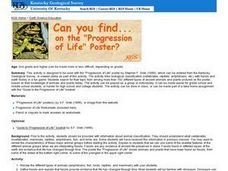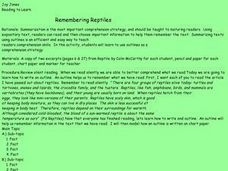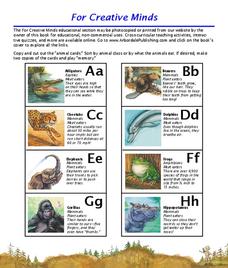Curated OER
Reptiles
In this reptiles worksheet, students will compare the characteristics of reptiles with the characteristics of amphibians to complete 2 short answer questions.
Curated OER
Frog Or Toad?
In this expository comprehension activity, students read a 1-page informational article about frogs and toads, answer short answer questions, and fill out a Venn diagram to compare the two amphibians.
Curated OER
Can You Find...on the "Progression of Life" Poster?
Students examine and analyze a poster that presents various types of animals throughout the ages. They determine biological classification with fossils and earth history in a game.
Curated OER
Classify That!
Students get acquainted with diverse forms of life by using modern biological classification systems to group animals that are related. They explore basic scientific groupings like genus, species, mammals, fish, birds, amphibians, and...
Curated OER
Animal Classification
Young scholars recognize the six groups of animals (Mammals, fish, birds, reptiles, amphibians and arthropods) and their characteristics. In this animal characteristics lesson, students sort animals by their traits. Young...
Curated OER
Classify That!
Young scholars explore diverse forms of life by using modern biological classification systems to group animals that are related. Students then study basic scientific groupings like genus, species, mammals, fish, birds, amphibians, and...
Curated OER
Biodiversity in Illinois-Pond Habitats
Second graders construct a pond habitat in the classroom using a small swimming pool partially filled with water, real cattails, a tree log adjoining, and plastic animal life appropriate to a pond setting. They examine the frog in detail...
Curated OER
Animals
Young scholars explore biology by participating in a science vocabulary activity. In this animal species lesson, students define a list of animal vocabulary terms as well as practice using them in sentences with the appropriate...
Curated OER
Animal Coverings
Students categorize animals by their coverings. They list descriptive words, explore a science center with actual animal coverings, match pictures of animals with coverings, and categorize pictures of animals by their coverings on a...
Curated OER
Steppin' Out: Using Inquiry to Challente Alexander's Stride Analysis
Students distinguish between walking, jogging and running trackways in humans. They analyze the phylogenetic progression of the leg position as described by pace width and angulation, comparing amphibians, reptiles and mammals. Research...
Curated OER
Mammals Have hair or Fur
First graders complete computer activities, make a mask, separate pictures, and more having to do with mammals. In this mammals lesson plan, 1st graders classify animals as being mammals or non mammals based on their hair or fur.
Curated OER
Population Densities
Students explore biological impact by completing a worksheet in class. In this animal population lesson plan, students utilize river rocks and jars to conduct a coqui frog population role play activity. Students define a list of...
Curated OER
Curious? It's Gotta Have Heart
In this "Curios? It's Gotta Have Heart" worksheet, students answer 4 multiple choice questions interactively with immediate feedback about a heart found in a dinosaur fossil.
Curated OER
Animals
In this animals worksheet, students guess the animals described with has got or hasn't got, complete questions, choose the correct animal, and more. Students complete 5 activities total.
Curated OER
Remembering Reptiles
Students will learn to use outlines as a comprehension strategy. Summarization is the most important comprehension strategy, and should be taught to maturing readers. During this instructional activity learners use the story of a reptile...
Curated OER
Animal Inventions
Students name the characteristics of animal groups. Students classify the major animal groups such as: mammals, birds, reptiles, amphibians, fish, and insects. They identify the elements of specific habitats that each animal needs in...
Curated OER
ABC Safari
Students study the animals and their alphabet letter. In this animal alphabet lesson, students associate the animals with their letter and learn facts about the animals. Students may use the cards to classify animals by groups or play a...
Biology Junction
Introduction to Animals Crossword Puzzle
In this introduction to animals instructional activity, learners complete a crossword puzzle with 47 questions on the types and characteristics of animals.
Curated OER
Dinosaurs
In this dinosaur worksheet, students focus on the myths associated with dinosaurs. Students complete 4 fill in the blank questions using the interactive drop down menu for each and a word search.
Curated OER
Reptile Round-UP
In this reptiles identification learning exercise, 3rd graders match 7 reptile names with their pictures. Students must draw a line to show the name of each reptile shown in the pictures provided.
Curated OER
What Are the Feet Used For?
In this animal anatomy instructional activity, students analyze 5 detailed pictures of frog and amphibian feet. Students match the pictures with the function from the word bank: climbing, gripping, burrowing, swimming or gliding.
Curated OER
How Do Animals Grow and Change?
In this animal growth worksheet, students will write in the 3 steps in a salamander's life cycle, from egg to adult. This worksheet is a graphic organizer.
Curated OER
Change by Chance?
Sixth graders are able to see the role of chance in evolution. The activity is similar to the party game "gossip" or "telephone." Students start off with a drawing of an animal which changes as they pass their copies of the animal to...
Curated OER
Toadstones, Snake Gods, and Divining Turtles
Students research facts about herps--reptiles and amphibians. They choose one or more facts to illustrate and create a drawing to be displayed.

























